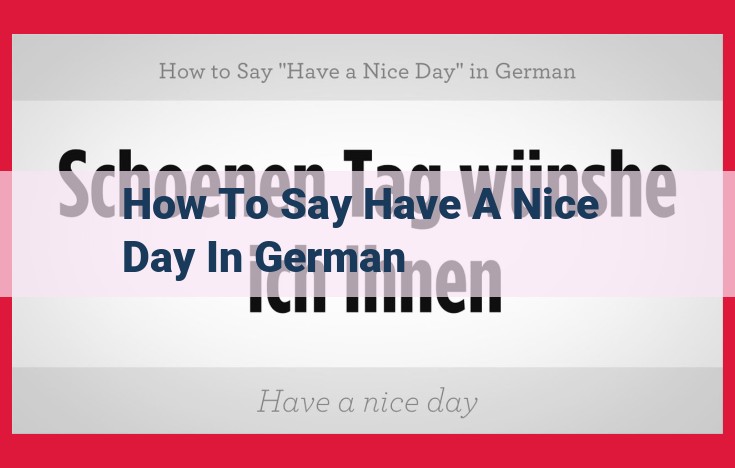Daytime Salutations: When parting ways during the day, Germans commonly use “Schönen Tag noch!” (Have a nice day) or “Einen schönen Tag noch!” (Have a beautiful day). A shorter version, “Schönen Tag!” or “Einen schönen Tag!”, is also acceptable.
Saying “Have a Nice Day” in German: A Guide to Common Greetings
When interacting with others in German, it’s essential to use appropriate greetings to express politeness and well wishes. One of the common expressions used to bid farewell or wish someone a pleasant day is “Have a nice day.” In German, several variations of this phrase exist, each with its nuances and contexts of use.
Schönen Tag!
This is the most concise way to say “Have a nice day” in German. It’s typically used in informal settings and is suitable for both acquaintances and close friends.
Einen schönen Tag!
“Einen schönen Tag” is slightly more formal than “Schönen Tag!” It’s commonly used in professional or semi-formal situations, such as when addressing customers or colleagues.
Schönen Tag noch!
literally translates to “Still have a nice day.” This phrase is used when you’re bidding farewell to someone who is leaving or going somewhere else. It’s a way of expressing a hope that the rest of their day will also be pleasant.
Einen schönen Tag noch!
Similar to “Schönen Tag noch!”, this phrase is also appropriate for bidding farewell. It’s slightly more formal and can be used in more professional contexts.
Saying Goodbye in German: A Guide to Departure Salutations
When it’s time to say farewell in German, you have a variety of expressions to choose from, each tailored to different situations. Here’s your guide to navigating the nuances of German departure salutations:
Auf Wiedersehen: The Standard Goodbye
For a general goodbye, the timeless classic is “Auf Wiedersehen,” which translates to “until we see each other again.” It’s a versatile phrase that can be used in most casual and formal settings.
Gute Fahrt: For Road Trips and Drives
If your friend or colleague is hitting the road, wish them a safe and pleasant journey with “Gute Fahrt,” meaning “have a nice drive.” This phrase is specifically used for driving situations.
Gute Reise: For Vacations and Travel
For those embarking on a longer trip or vacation, the appropriate salutation is “Gute Reise,” which translates to “have a good trip.” This phrase expresses well wishes for their journey and a safe return.
Bis Bald: A Casual See You Soon
For a more casual goodbye with someone you expect to see again soon, use “Bis bald,” meaning “until soon.” It’s a friendly way to end a conversation, implying that you’ll be catching up again before too long.
Tschüss: Informal and Friendly
“Tschüss” is a widely used informal goodbye, similar to “ciao” in Italian. It’s常见于younger people and in casual settings. While not as formal as “Auf Wiedersehen,” it’s still polite and appropriate in most situations.
Mach’s Gut: A Well-Wishing Farewell
“Mach’s gut” translates to “take care” and is a heartfelt expression of concern for someone’s well-being. It’s a thoughtful way to say goodbye to a friend or loved one, wishing them all the best in their future endeavors.
Time-Related Greetings in German: Expressing Yourself with Nuance
When interacting with German speakers, it’s essential to convey your greetings appropriately according to the time of day. This not only shows respect but also helps you connect more effectively. Here are the most common time-related greetings you should know:
-
Guten Morgen (Good morning): Used from sunrise until around noon. This greeting is often accompanied by a friendly smile and a nod.
-
Guten Tag (Hello): Literally meaning “good day,” this greeting can be used from noon until sunset. It’s the most common and versatile greeting, suitable for most situations.
-
Guten Abend (Good evening): Reserved for the evening hours, from sunset until bedtime. When greeting someone for the first time in the evening, you can add “sehr” (very) to convey extra warmth: “Guten Abend, sehr geehrte/r Herr/Frau [Name]”.
By understanding and using these time-related greetings correctly, you’ll demonstrate your cultural sensitivity and make a positive impression on German speakers.
